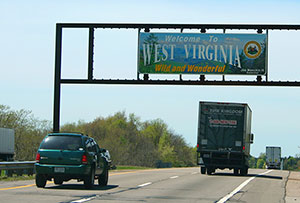West Virginia Senator Says It's Time to Address State’s Roads

As the Senate Transportation Committee advanced a bill Feb. 9 to keep tolls on the West Virginia Turnpike, one senator said it's well past time for the state to have a plan for transportation funding.
“Our roads are so horrible out there right now, we better come up with a comprehensive plan that looks at everything,” state Sen. Robert Plymale said.
Plymale said other states have taken the lead in funding their highways, including Ohio, which adopted Access Ohio, a $3 billion program to complete 41 major road projects, funded through a small increase in tolls on the Ohio Turnpike.
“We’ve got the Ohio plan. We’ve got a number of other examples of what we should be doing,” he said. “If we’re going to do this, let’s do it right and look at what Ohio and other states have done.”
Plymale noted that nothing has come of the Gov. Earl Ray Tomblin’s Blue Ribbon Commission on Highways, which conducted an extensive study of state road funding issues and released its recommendations last May.
That commission concluded that West Virginia needs to be spending an additional $750 million a year to adequately maintain its roadways and an additional $380 million a year to complete proposed highway construction projects within a reasonable time.
Essentially, that would require doubling current annual spending on state highways.
The commission proposed about $141 million a year in new revenue through a variety of fee increases, and Plymale was lead sponsor of a bill last year that would have enacted those increases. The bill was never taken up.
He said Feb. 9 that constituents are irate that nothing is being done to fix the state’s deteriorating roadways.
“They’re pretty upset [that] there’s been no effort to look at a long-term fix for road maintenance or any new construction,” he said.
“If we’re going to diversify our economy, one of the elements you have to have is a transportation system that can move goods efficiently,” Plymale added, noting that the highway serving the new Heartland Intermodal Gateway at Prichard, U.S. 52, is in need of major upgrades.
The centerpiece of the Blue Ribbon Commission’s recommendations was a $1 billion road bond issue, to be paid by continuing tolls on the Turnpike through 2049.
Under existing law, tolls on the Turnpike are to expire in May 2019, when the $300 million road bond issued in 1989 is paid off.
The bill advanced Feb. 9 would keep tolls on the Turnpike after the bonds are retired in May, retaining a source of revenue that provides $85 million a year, more than 75 percent of which is paid by out-of-state travelers and trucking companies.
Committee members received copies of a resolution adopted by the Parkways Authority encouraging the Legislature to keep tolls on the Turnpike, citing the potential loss of revenue, as well as the loss of as many as 360 full- and part-time jobs.
Committee members Tuesday adopted an amendment by state Sen. Bob Beach, which would cap funding for maintenance and operations of the Turnpike at $55 million a year, despite concerns raised by Brian Helmick, the Parkways Authority’s bond counsel.
Helmick advised that federal highways regulations generally require that all toll revenue be spent on the toll road or on routes that feed into the toll road.
“You can’t just, carte blanche, direct the state to use these monies,” he said.
If the bill passes the Senate, its fate in the House of Delegates is uncertain. House Roads and Transportation Chairman Marty Gearhart attended the Feb. 9 meeting, but did not address the committee.
Gearhart is lead sponsor of a bill (HB 4222) that outlines the dismantling of the Parkways Authority after the Turnpike bonds are retired, and has said retaining tolls on the Turnpike would be “a broken promise to the people of Southern West Virginia.”
Committee members also reviewed a memorandum from West Virginia University law professor Bob Bastress for options to give state residents a discount on Turnpike tolls without violating the commerce clause of the U.S. Constitution.
Among the options: Increasing motor vehicle registration fees to cover the costs of Turnpike tolls paid by state residents.
Under the option, which Bastress estimated would increase registration fees by about $6.40 a year for passenger vehicles up to about $25 for large trucks, vehicle owners would receive a special EZ-Pass transponder that would not charge for passing through toll barriers.




